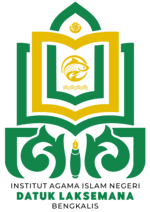Pengaruh Pembelajaran Kooperatif Tipe Student Team’s Achievement Division (STAD) terhadap Hasil Belajar Fiqih Siswa Kelas VII MTS Masmur Pekanbaru
DOI:
https://doi.org/10.56633/jkp.v17i2.267Keywords:
learning outcomes, cooperative learning, student team's achievement divisionAbstract
This study aims to determine whether or not there is a significant effect of Student Team's Achievement Division (STAD) Cooperative Learning on students' fiqh learning outcomes. The form of this research is Quasi Experiment with a Posttest-only Design with a Nonequivalent Group. The subjects studied were 75 students of class VII MTs Masmur Pekanbaru, while the object of the study was the result of learning fiqh. Data retrieval using documentation techniques, tests, and observations is carried out every meeting. The action was carried out six times, namely four meetings using the Student Team's Achievement Division (STAD) Cooperative Learning Type, one post-test meeting, and one practical exam meeting. Research data were analyzed using the t-test formula. The results showed that the Student Team's Achievement Division (STAD) Cooperative Learning had a significant effect on fiqh learning outcomes.
References
Asma, Nur. Model Pembelajaran Kooperatif. Jakarta: Departemen Pendidikan Nasional, 2006.
Alma, Buchari dkk. Guru Profesional. Surabaya: Unesa, 2000.
Abdurrahman, Mulyono. Pendidikan Bagi Anak Berkesulitan Belajar. Jakarta: Rineka Cipta, 2003.
B.Uno, Hamzah. Perencanaan Pembelajaran. Gorontalo: Bumi Aksara, 2006.
Djamarah, Syaiful Bahri, dkk. Strategi Belajar Mengajar Edisi Revisi. Jakarta: Rineka Cipta, 2006.
Dimyati dan Mudjiono. Belajar dan Pembelajaran. Jakarta: Rineka Cipta, 2002.
Djamarah, Syaiful Bahri. Psykologi Belajar. Jakarta: Rineka Cipta, 2002.
Departemen Pendidikan Nasional. Kamus Besar Bahasa Indonesia. Jakarta: Balai Pustaka, 2005.
Hakim. Belajar Secara Efektif. Jakarta: Puspaswara, 2002.
Hartono. Statistik Untuk Penelitian. Yogyakarta : LSFK2P, 2006.
http://id.shvoong.com/social-sciences/education/2246532-pengertian-mata-pelajaran-fiqih/
Ibrahim, Muslim. Pembelajaran Kooperatif. Surabaya: UNESA, 2000.
Ibrahim, Muslim. Pembelajaran Kooperatif. Surabaya: University Press, 2001.
Lie, Anita. Cooperative Learning (Mempraktekkaan Cooperative Learning di ruang-ruang kelas). Jakarta: PT Gramedia Widiasarana Indonesia, 2000.
Mimi Hariani, Pembelajaran Matematika Dengan Metode Penemuan Terbimbing Untuk Meningkatkan Pemahaman Konsep Dan Kemampuan Penalaran Matematik Siswa Sekolah Dasar. Bandung: Program Studi Magister Pendidikan Dasar Sekolah Pasca Sarjana Universitas Pendidikan Indonesia, 2010.
Risnawati. Strategi Pembelajaran Matematika. Pekanbaru: Suska Press, 2008.
Roestiyah. Strategi Belajar Mengajar. Jakarta: Rineka Cipta, 2002.
Slameto. Belajar dan Faktor-Faktor yang Mempengaruhinya. Jakarta: Rineka Cipta, cet 4, 2003.
Sudjana, Nana. Penilaian Hasil Proses Belajar Mengajar. Bandung: Remaja Rosdakarya, 2008.
Slavin, Robert E. Cooperative Learning. Bandung: Nusa Media, 2005.
Sanjaya, Wina. Strategi Pembelajaran Berorientasi Standar Proses Pendidikan. Jakarta: Kencana, 2010.
Sardiman, A.M. Interaksi dan motivasi Belajar Mengajar. Jakarta: PT Raja Grafindo Persada, 2001.
Sudijono, Anas. Pengantar Statistik Pendidikan. Jakarta: PT. Raja Grafindo Persada, 2009.
Sugiyono, Metode Penelitian Kuantitatif Kualitatif dan R & D. Bandung: Alfabeta, 2011.
Sabiq, Sayyid. Fiqih Sunnah 1.Jakarta: Al-I’tishom, 2010.
Trianto. Mendesain Model Pembelajaran Inovatif-Progresif. Surabaya: Kencana, 2009.
Wena, Made. Strategi Pembelajaran Inovatif Kontemporer. Jakarta: PT. Bumi Aksara, 2009.
Yamin, Martinis dan Bansu I. Ansara. Taktik Mengembangkan Kemampuan Individual Siswa. Jakarta: Gaung Persada Press, 2008.
Slamet, Yunus. Pengantar Penelitian Kuantitatif Surakarta : Lembaga Pengembangan Pendidikan (LPP) dan UPT Penerbit dan Percetakan UNS (UNS Press), 2008.
Downloads
Published
Issue
Section
License
Authors who publish with this journal agree to the following terms:
- Authors retain copyright and grant the journal right of first publication with the work simultaneously licensed under a Creative Commons Attribution-ShareAlike 4.0 International License. that allows others to share the work with an acknowledgement of the work's authorship and initial publication in this journal.
- Authors are able to enter into separate, additional contractual arrangements for the non-exclusive distribution of the journal's published version of the work (e.g., post it to an institutional repository or publish it in a book), with an acknowledgement of its initial publication in this journal.
- Authors are permitted and encouraged to post their work online (e.g., in institutional repositories or on their website) prior to and during the submission process, as it can lead to productive exchanges, as well as earlier and greater citation of published work (See The Effect of Open Access).






